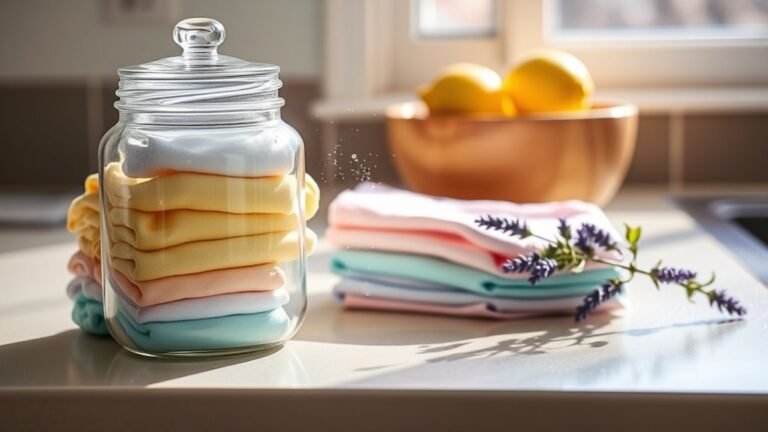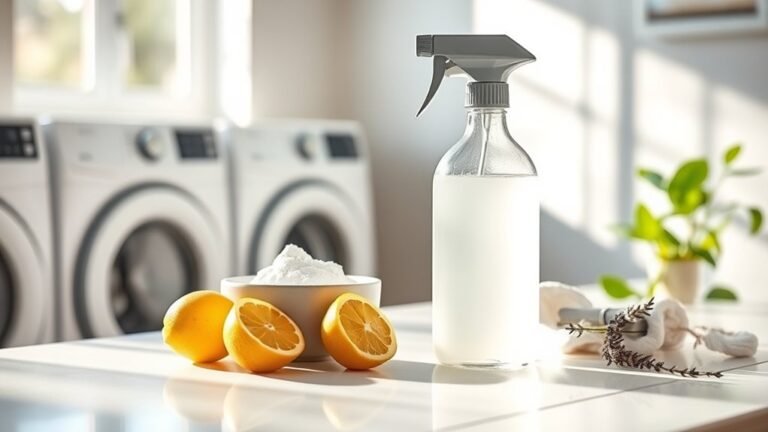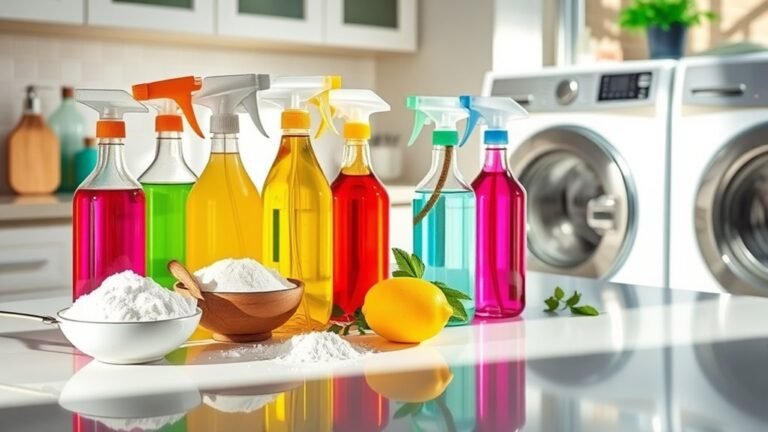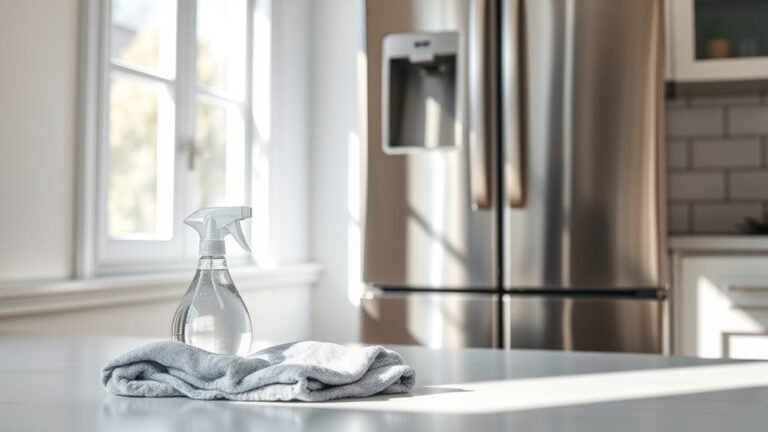DIY Cleaner for Dishwasher Surfaces
You can make an effective DIY cleaner for your dishwasher surfaces using natural ingredients like white vinegar, baking soda, and lemon juice. These help cut through grease, remove buildup, and leave your dishwasher smelling fresh without harsh chemicals. Just mix baking soda with vinegar, apply inside, and run a hot cycle. Regular use keeps your dishwasher clean and efficient. Keep going to discover easy tips and tricks to maintain a spotless, fresh dishwasher every time.
Benefits of Using a Homemade Dishwasher Cleaner
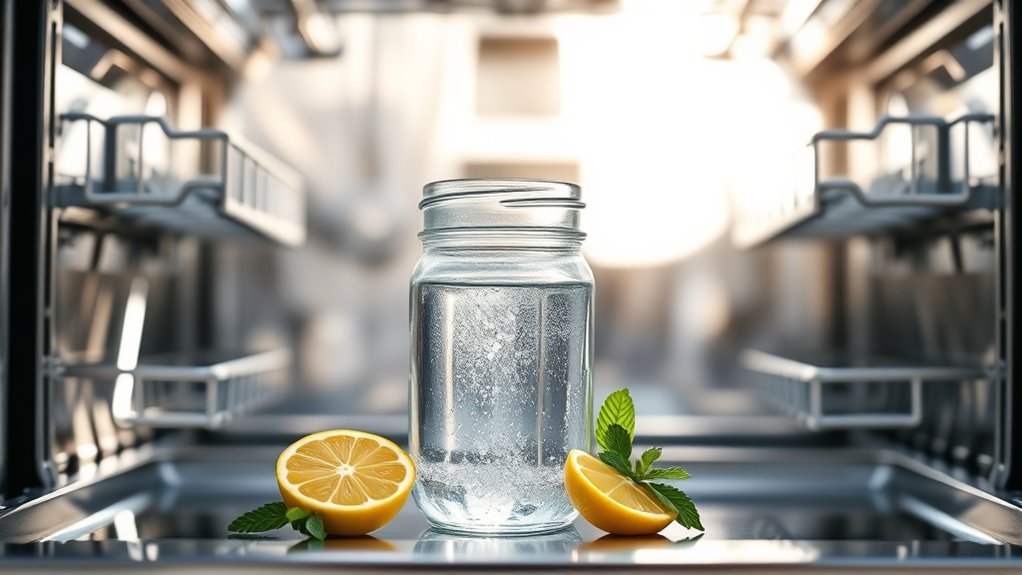
Although commercial dishwasher cleaners are readily available, using a homemade cleaner offers several advantages. When you create your own solution, you gain control over the ingredients, choosing eco friendly options that protect both your home and the planet. This means less exposure to harsh chemicals and a safer environment for you and your family. Plus, making your own cleaner is a cost effective solution that saves you money over time, freeing you from the cycle of purchasing expensive, brand-name products. You’ll enjoy the satisfaction of self-reliance, knowing you’re maintaining your dishwasher with simple, natural ingredients. Embracing this approach supports your desire for independence and sustainability without sacrificing effectiveness or convenience.
Essential Ingredients for Your DIY Cleaner
To make an effective DIY dishwasher cleaner, you’ll want to focus on natural cleaning agents that break down grime without harsh chemicals. Adding safe abrasive materials helps scrub away stubborn residue without damaging surfaces. You can also include fragrances or other additives to leave your dishwasher smelling fresh and clean.
Natural Cleaning Agents
When you’re making your own dishwasher cleaner, choosing natural ingredients can be both effective and safe for your appliance. Natural alternatives like white vinegar and baking soda are powerful at cutting through grease and eliminating odors without harsh chemicals. These eco friendly options help maintain your dishwasher’s inner surfaces while protecting the environment. Lemon juice adds a fresh scent and acts as a natural disinfectant. You’ll appreciate how these simple, readily available ingredients provide freedom from commercial cleaners packed with unknown additives. Using natural cleaning agents guarantees your dishwasher stays spotless and runs efficiently, all while supporting a sustainable lifestyle. Embracing these eco friendly choices means you’re in control, enjoying a cleaner home and a cleaner conscience with every wash.
Safe Abrasive Materials
Since natural cleaning agents work great for dissolving grime, you’ll also need safe abrasive materials to tackle stubborn buildup on your dishwasher surfaces. Baking soda is a perfect choice—it’s gentle yet effective at scrubbing away residue without scratching delicate parts. You can sprinkle it directly or mix it into a paste for targeted cleaning. Sea salt is another excellent option, offering slightly coarser texture to break down tougher deposits while still being safe for your dishwasher’s interior. Both ingredients give you the freedom to clean thoroughly without harsh chemicals. By combining baking soda and sea salt, you create a customizable abrasive cleaner that respects your appliance and the environment, letting you maintain your dishwasher’s shine and function with confidence.
Fragrance and Additives
Although baking soda and sea salt handle the scrubbing, adding fragrance and other additives can elevate your DIY cleaner by making your dishwasher smell fresh and boosting its cleaning power. You’ve got plenty of fragrance options to choose from—essential oils like lemon, eucalyptus, or lavender not only leave a pleasant scent but also offer natural antibacterial properties. Beyond fragrance, additives such as white vinegar or a few drops of castile soap enhance grease-cutting and residue removal. These additive benefits help keep your dishwasher spotless without harsh chemicals, giving you freedom to customize your cleaner. By selecting the right combo, you make your dishwasher maintenance both effective and enjoyable, ensuring a fresh-smelling appliance every time you run it.
Step-by-Step Guide to Making the Cleaner
Now that you have your essential ingredients ready, let’s walk through the simple steps to mix and apply your DIY dishwasher cleaner. You’ll see how easy it is to combine everything for the best results. Follow along to get your dishwasher sparkling clean in no time.
Essential Ingredients Needed
Before you start making your DIY dishwasher cleaner, you’ll need to gather a few essential ingredients that are both effective and easy to find. Opting for cleaning alternatives that are gentle yet powerful lets you maintain your freedom from harsh chemicals. You’ll want white vinegar for its natural acidity, baking soda to tackle stubborn grime, and a few drops of essential oils like lemon or tea tree for a fresh scent and added antibacterial properties. These eco friendly options not only protect your dishwasher surfaces but also reduce environmental impact. By choosing these simple, natural ingredients, you create a cleaner that’s safe for your home and the planet—giving you peace of mind and the freedom to clean without compromise.
Mixing and Application Steps
To make your DIY dishwasher cleaner, you’ll need to combine just a few simple ingredients in the right order. Start by measuring your ingredients carefully, following precise mixing ratios—usually one cup of white vinegar, half a cup of baking soda, and a few drops of essential oil for scent. Slowly add the baking soda to the vinegar to avoid overflow, stirring gently until the mixture is smooth.
For application techniques, pour the cleaner into a spray bottle for easy use. Spray the solution onto the dishwasher’s interior surfaces, including racks and door seals. Let it sit for 10-15 minutes to break down grime. Finally, wipe everything down with a clean cloth and run an empty cycle to rinse thoroughly. This method keeps your dishwasher fresh and fully functional.
How to Use the Cleaner in Your Dishwasher

Although using your DIY cleaner is straightforward, following a few simple steps guarantees the best results. Regular dishwasher maintenance boosts efficiency and extends appliance life. Pay attention to cleaning frequency—once a month is ideal for most households.
| Step | What to Do |
|---|---|
| 1. Empty | Remove all dishes and racks |
| 2. Apply | Sprinkle or spray your DIY cleaner |
| 3. Run Cycle | Use a hot water cycle without detergent |
| 4. Wipe Down | After cycle, clean seals and interior |
Stick to this routine, and you’ll enjoy a fresher dishwasher without hassle. Freedom from grime is just a simple process away—embrace the ease and keep your dishwasher running smoothly!
Tips for Maintaining a Fresh Dishwasher
Since a fresh dishwasher starts with consistent care, you’ll want to adopt simple habits that keep odors and buildup at bay. One of the best dishwasher maintenance tips is to run the appliance regularly, ensuring food particles don’t linger and cause smells. Pay attention to cleaning frequency—aim to clear filters and wipe down seals at least once a month. Using your DIY cleaner after every few cycles can also make a huge difference, breaking down grease and mineral deposits before they become a problem. Don’t forget to leave the door slightly open after a run to let moisture escape, preventing mold growth. By sticking to these easy steps, you’ll enjoy a dishwasher that stays fresh and efficient, giving you more freedom from constant upkeep.
Common Mistakes to Avoid When Cleaning Your Dishwasher

How often do you find yourself scrubbing your dishwasher only to feel like it’s still not quite clean? The problem might lie in cleaning frequency or using improper products. Cleaning too rarely lets grime build up, while overdoing it can harm seals. Using harsh chemicals or abrasive tools can damage surfaces and reduce your dishwasher’s lifespan.
| Mistake | Why to Avoid It |
|---|---|
| Infrequent cleaning | Leads to buildup and odor |
| Over-cleaning | Wears out seals and parts |
| Using improper products | Can corrode or dull dishwasher parts |
| Neglecting filters | Causes clogs and poor cleaning |
Avoid these mistakes, and you’ll enjoy a truly fresh, long-lasting dishwasher without feeling trapped in endless chores.
Frequently Asked Questions
Can DIY Dishwasher Cleaners Damage the Dishwasher’s Warranty?
You might wonder if using homemade solutions could affect your dishwasher’s warranty. It really depends on the cleaner ingredients you use. Harsh chemicals or abrasive substances can cause damage, leading to warranty implications if the manufacturer finds the DIY cleaner responsible. However, if you stick to gentle, natural ingredients, you’re less likely to face issues. Always check your warranty terms so you can keep your freedom to clean without risking coverage.
How Often Should I Deep Clean My Dishwasher Professionally?
You should consider a deep cleaning frequency of once or twice a year to keep your dishwasher running smoothly. Professional cleaning benefits include thorough removal of buildup and hard-to-reach grime, which can extend your appliance’s lifespan and improve performance. While you might enjoy some freedom with DIY methods, scheduling professional deep cleaning guarantees your dishwasher stays in top shape without you having to worry about hidden issues or potential damage.
Are Homemade Cleaners Safe for Septic Systems?
Think of your septic system as a delicate garden—what you put in it either nourishes or harms its growth. When you use homemade cleaners with safe ingredients like baking soda, vinegar, and lemon juice, you’re choosing freedom from harsh chemicals while protecting septic health. These natural elements break down gently, keeping your system balanced and thriving. So yes, with the right ingredients, homemade cleaners can be a safe, eco-friendly choice you can trust.
Can I Use DIY Cleaners on Other Kitchen Appliances?
You can definitely use DIY cleaners on other kitchen appliances, but it’s important to contemplate kitchen appliance maintenance to keep them running smoothly. Homemade solutions often offer safe cleaning alternatives without harsh chemicals, which means less risk of damage. Just make sure the ingredients are suitable for the appliance’s surface—like avoiding abrasive scrubs on delicate screens. With a little care, you’ll enjoy freedom from pricey products and still keep everything sparkling.
What Are Signs My Dishwasher Needs Repair, Not Just Cleaning?
If your dishwasher is leaking water, that’s a clear sign it needs repair, not just a good cleaning. You might also notice strange noises during cycles—grinding or banging sounds aren’t normal and can indicate mechanical issues. If dishes aren’t coming out clean despite regular maintenance, or it won’t drain properly, it’s time to call a pro. Don’t let these problems limit your freedom to enjoy effortless dishwashing!

